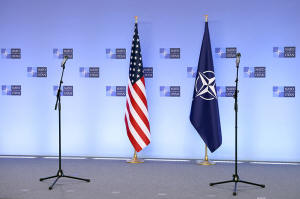Biden's shaky debate has overseas allies bracing for Trump return
 Send a link to a friend
Send a link to a friend
 [June 28, 2024]
By David Dolan and Heekyong Yang [June 28, 2024]
By David Dolan and Heekyong Yang
TOKYO/SEOUL (Reuters) -While the first U.S. presidential debate of the
2024 race dwelled little on foreign policy, a shaky performance by
President Joe Biden will have America's allies steeling for the return
of Donald Trump, analysts say.
Biden's supporters had hoped the debate would erase worries that he was
too old to serve, but several lawmakers, analysts and investors said the
event had given Trump a boost.
"Mr. Trump didn't win but Mr. Biden might have imploded," said Kunihiko
Miyake, a former Japanese diplomat and now research director at the
Canon Institute for Global Studies, a think tank.
"Unlike eight years ago, we are much more prepared, as are other
European and Asian allies. Still, Mr. Trump is unpredictable."
For Japan and South Korea, among the closest U.S. allies in Asia,
relations with Trump's administration were at times strained by his
demands for more payments towards military assistance as well as trade
tensions.
"The biggest question for Japan would be whether Trump will truly value
and maintain the security alliance," said Takashi Kawakami, a professor
at Japan's Takushoku University in Tokyo.
Peter Lee, research fellow at the Asan Institute for Policy Studies in
Seoul, said the debate had put into "much more stark relief" the
possibility of a second Trump administration. Lee said he expected Trump
to be "very tough" second time around in pressuring allies to up their
defense spending.
Trump also started a tariff war with China, the world's second largest
economy, and has floated tariffs of 60% or higher on all Chinese goods
if he wins the Nov. 5 election.

Overseas firms dependent on U.S. markets, such as automakers, would also
be wary of the heightened possibility of Trump's return given the
"myriad" of tariff-related policies he imposed during his previous term,
said Lee Jae-il, analyst at Eugene Investment & Securities.
"Trump, like a trade war maniac, might not just target China but impose
tariffs against other countries as well under the concept of American
exceptionalism," added Stephen Lee, chief economist at Meritz Securities
in Seoul.
WAR IN UKRAINE
In Europe, Trump's criticisms of the North Atlantic Treaty Organisation
and demands that other members pay more dominated his previous
administration. His scepticism towards NATO is causing further anxiety
this time, as Russian's war in Ukraine has brought conflict to the
bloc's doorstep.
German Chancellor Olaf Scholz previously cheered on Biden's prospects
for re-election. But on Friday a senior defence figure in the ruling
coalition lamented Biden's performance and urged Democrats to find
another candidate.
"The fact that a man like Trump could become president again because the
Democrats are unable to put up a strong candidate against him would be a
historic tragedy that the whole world would feel," Marie-Agnes Strack-Zimmermann,
of the liberal FDP party, told the Rheinische Post paper.
[to top of second column]
|

NATO and U.S. flags are seen before a news conference at NATO's
headquarters in Brussels, Belgium April 14, 2021. Kenzo Tribouillard/Pool
via REUTERS/File Photo

A spokesperson for Scholz did not comment on the specifics of the
debate, but stressed the chancellor valued Biden highly and that
Scholz had never spoken to Trump as their terms did not overlap.
During the debate, Trump accused Biden of not standing up to China
on trade. He also said China's Xi Jinping, North Korea's Kim Jong Un
and Russia's Vladimir Putin "don't respect" Biden and that he was
driving the country "into World War Three".
Biden retorted by saying Trump's tariff proposals would result in
higher costs for American consumers, and that he "cuddles up" to the
likes of Kim and Putin.
Putin has said it made little difference to Russia who was in the
White House, and on Friday the Kremlin declined comment on what it
said was an internal U.S. matter.
U.S. allies including Japan and Germany have in any case started
laying the groundwork for a possible Trump return in recent months.
"The possibility of a Trump comeback may have increased. High
tariffs and support for Ukraine will also bring about major
changes," said Kazuhiro Maeshima from the Sophia University in
Tokyo.
"The Japanese government has also been anticipating various
developments in the event of a Trump and has been gradually taking
steps to deal with them, including making contact with people close
to Trump."
'TRUMP 2.0'
In Sydney, several Australian officials and experts had attended a
workshop titled "Trump 2.0" as the debate was aired.
"The overwhelming feeling from today is that it was a disaster for
Biden," said Peter Dean, a professor at the United States Studies
Centre in Sydney who was at the workshop.
"The mood has changed considerably after the debate and the general
view is that if you weren't preparing for a Trump 2.0 then that is
the smart play and the smart move now."
Keir Starmer, the leader of Britain's Labour party and the
frontrunner in an election due next week, was asked on BBC radio if
he was concerned about Biden after the debate.
"I've got enough on my hands with our own election campaign at the
moment...The relationship between the UK and the US is strong, it's
historic, and obviously, it's above the individuals," he said.
(Additional reporting by Tim Kelly in Tokyo, Hyunsu Yim and Jihoon
Lee in Seoul and Lewis Jackson in Sydney, Friederike Heine in
Berlin; Writing by John Geddie and Matthias Williams; Editing by
Miral Fahmy and Alex Richardson)
[© 2024 Thomson Reuters. All rights reserved.]This material
may not be published, broadcast, rewritten or redistributed.
Thompson Reuters is solely responsible for this content.
 |